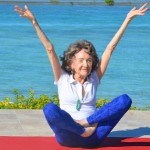Tammy, 87, wrote us a letter that tells, straight from the heart, the lessons learned over a long and full life. From marriage, to education, to work, these lessons are worth a careful read. (And anyone out there who was in a 4-H club, you will find the 4-H pledge here, too!)
marriage, to education, to work, these lessons are worth a careful read. (And anyone out there who was in a 4-H club, you will find the 4-H pledge here, too!)
I am pleased to submit my response to the letter asking for comments on what we have learned over the course of our lives.
Having been married sixty-one years, I have had a chance to learn many lessons. One of the foremost is the need to communicate. This applies to family or employer. Along with communicating in order to have good relations, one must be willing to cooperate by compromising or even putting one’s own opinion aside.
My second lesson would be getting enjoyment out of each situation. In married life this would be with each child that is born, in participation in all your children’s activities, interest in your husband’s work, and taking an active part in community activities.
My advice for a happy life is to take advantage of opportunities as they come along. Value your education, be a faithful, honest employee, and if raising a family is one’s path, strive for a healthy and happy family. It all takes determination.
My prescription for life is pretty well summarized in the 4-H pledge which I learned years ago. I pledge my head to clearer thinking, my heart to greater loyalty, my hands to greater service, and my health to better living for my family (club), community, and my country.
We only go through this life once, and it can be a satisfying experience if we set our minds to it. It is sad today to see so many lives wasted by turning to self-gratification and lack of good goals. There is truth in the saying, “smile and the world smiles with you, weep and you weep alone.” Be thankful for every day.
I am so grateful that I was able to attend college. It certainly prepared me for the years that followed. As I look back, I know I didn’t take full advantage of all the wonderful experiences college offered but only maturity gives one a perspective to see things one may have missed.
 December 17 to join us, it should be a memorable event.
December 17 to join us, it should be a memorable event.








